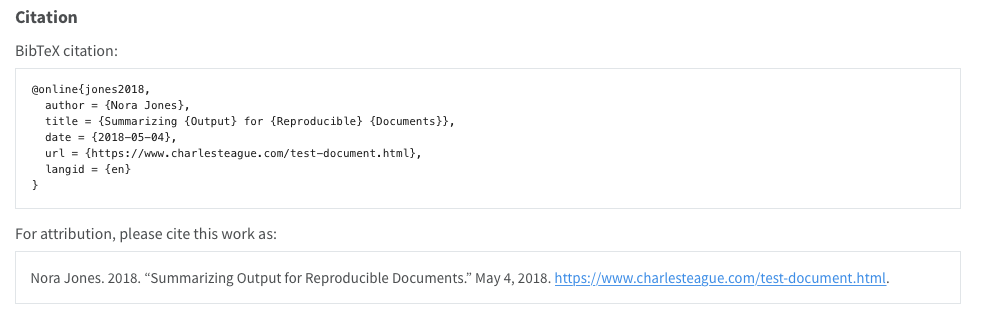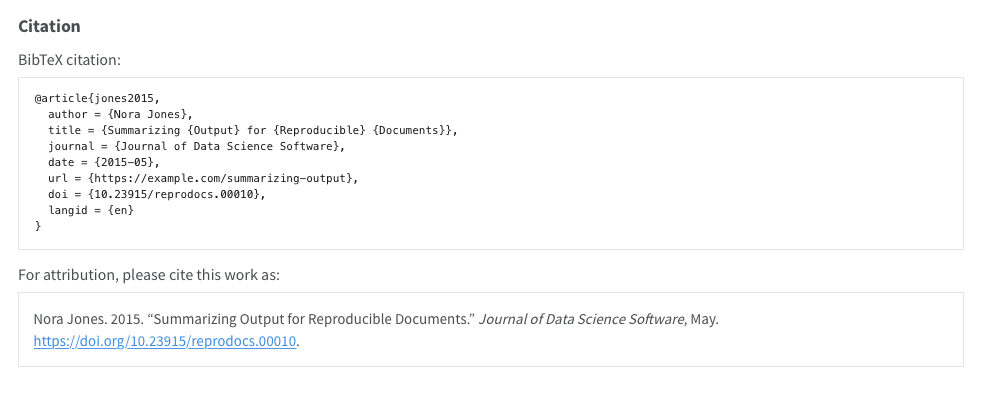Creating Citeable Articles
You can make it easier for others to cite your work by providing additional metadata with the YAML front-matter of your article. Citations can be provided for both articles published to the web or for articles published in journals (with or without a DOI).
Web Articles
To provide a citation for an article published to the web, include author and date metadata as well as a citation url. For example:
---
title: "Summarizing Output for Reproducible Documents"
description: |
A summary of the best practices for summarizing output of reproducible scientific documents.
date: 5/4/2018
author:
- name: Norah Jones
url: https://example.com/norahjones
affiliation: Spacely Sprockets
affiliation-url: https://example.com/spacelysprockets
citation:
url: https://example.com/summarizing-output
bibliography: biblio.bib
---Name particles can be further defined in the name key following the Citation Style Language (CSL) specification for naming particles. If you omit the citation url, Quarto will attempt to generate a citation url by using the site-url and the current page’s location. If you’d like to allow Quarto to generate the citation url, you can omit the citation url and simply enable citation output on the page. For example:
---
title: "Summarizing Output for Reproducible Documents"
description: |
A summary of the best practices for summarizing output of reproducible scientific documents.
date: 5/4/2018
author:
- name: Norah Jones
url: https://example.com/norahjones
affiliation: Spacely Sprockets
affiliation-url: https://example.com/spacelysprokets
citation: true
bibliography: biblio.bib
---When this metadata is available, a citation appendix is automatically added to the article. The citation appendix will present both a copy-able bibtex representation of the document and a formatted representation of the citation (based upon the document’s CSL file, if specified). For example:

By default both the bibtex and formatted representations are displayed. You can use the appendix-cite-as option to control this behavior:
appendex-cite-as: false |
Do not include any citations in the appendix. |
appendix-cite-as: bibtex |
Show only the BibTeX version of the citation. |
appendix-cite-as: display |
Show only the display version of the citation. |
Journal Articles
If your article is published within a Journal, you can add the following the additional fields to generate the appropriate citation entry:
---
title: "Summarizing Output for Reproducible Documents"
description: |
A summary of the best practices for summarizing output of reproducible scientific documents.
date: 5/4/2018
author:
- name: Norah Jones
url: https://example.com/norahjones
affiliation: Spacely Sprockets
affiliation-url: https://example.com/spacelysprokets
citation:
type: article-journal
container-title: "Journal of Data Science Software"
doi: "10.23915/reprodocs.00010"
url: https://example.com/summarizing-output
bibliography: biblio.bib
---This is how the citation is presented in the appendix:

Other Types of Documents
The BibTeX and formatted attribution displayed in the document will be generated based upon the complete citation information that is present in the citation key, which is based upon the Citation Style Language (CSL) specification for items. You can learn more about the available options in the Citation Metadata Reference.
Google Scholar
Quarto documents can include metadata compatible with the format indexed by Google Scholar. This makes it easy for indexing engines (Google Scholar or otherwise) to extract not only a citation for your article but also information on other sources which you cited. To enable this use the google-scholar option:
title: "Summarizing Output for Reproducible Documents"
description: |
A summary of the best practices for summarizing output of reproducible scientific documents.
date: 5/4/2018
author:
- name: Norah Jones
url: https://example.com/norahjones
affiliation: Spacely Sprockets
affiliation-url: https://example.com/spacelysprokets
citation:
type: article-journal
container-title: "Journal of Data Science Software"
doi: "10.23915/reprodocs.00010"
url: https://example.com/summarizing-output
bibliography: biblio.bib
google-scholar: trueFor example, here is the Google Scholar metadata automatically included for a document created with the above metadata:
<meta name="citation_title" content="Summarizing Output for Reproducible Documents">
<meta name="citation_author" content="Norah Jones">
<meta name="citation_online_date" content="2018-05-04">
<meta name="citation_fulltext_html_url" content="https://example.com/summarizing-output">
<meta name="citation_publication_date" content="2018-05-04">
<meta name="citation_journal_title" content="Journal of Data Science Software">
<meta name="citation_reference" content="citation_title=Donald knuth;,citation_fulltext_html_url=http://dx.doi.org/10.7551/mitpress/
5485.003.0041;,citation_publication_date=1989;,citation_journal_title
=undefined;">In the addition to the citation metadata from this document described above, Quarto will automatically generate a citatation_reference entry for each of the entries included in the document’s bibliography.
Citation Fields
Quarto’s approach to emitting scholarly metadata is to take the standard CSL fields and make them into the corresponding Google Scholar / Zotero / Highwire metadata tags as appropriate. The following fields, when specified under the citation key of the document metadata, will generate scholarly meta tags in the rendered HTML document as described. These fields comprise the required Google Scholar fields as well as additional, optional fields that may also be included.
| Document Yaml | Metadata Tag |
|---|---|
titleDocument title will be used if not provided. |
citation_title |
authorOne or more authors1. Document author will be used if not provided as a citation subkey. |
citation_author |
editorOne or more editors2. |
citation_editor |
abstractDocument abstract will be used if not provided. |
citation_abstract |
keyword3Document keywords will be used if not provided. |
citation_keywords |
issuedDocument date will be used if not provided. |
In addition, the issued date will be used to populate the following fields: |
available-dateDocument date will be used if not provided. |
citation_online_date |
urlurl will be synthesized for current document if a site-url has been specified. |
citation_fulltext_html_url |
pdf-url |
citation_pdf_url |
languageDocument lang will be used if not provided. |
citation_language |
typeA valid CSL type. See https://docs.citationstyles.org/en/stable/specification.html#appendix-iii-types. |
<none> |
doiDocument doi will be used if not provided. |
citation_doi |
isbn |
citation_isbn |
issn |
citation_issn |
eissn |
citation_eissn |
pmid |
citation_pmid |
issue |
citation_issue |
volume |
citation_volume |
pageWill be split on - to create appropriate page metadata. |
|
page-first |
citation_firstpage |
page-last |
citation_lastpage |
abstract-url |
citation_abstract_html_url |
container-title |
For specific types, other meta tags will be produced:
|
number |
|
publisher |
For specific types, other meta tags will be produced:
|
container-title-short |
citation_journal_abbrev |
collection-title |
citation_series_title |
For example, citation data for a published conference paper defined as such in the document front matter:
title: A Published Conference Paper
author:
- name: Norah Jones
affiliation: School of Hard Knocks
orcid: 0000-0001-8715-9476
citation:
type: paper-conference
container-title: "Proceedings of the annual conference of the Society for Research"
publisher: "Society for Research"
issued: 2020/09/23
volume: 2
doi: "10.23915/reprodocs.00010"
url: https://example.com/summarizing-output
page-first: 46
page-last: 53
editor:
- Don Draper
- Nick Fury
google-scholar: true provides HTML metadata like:
<meta name="citation_title" content="A Published Conference Paper">
<meta name="citation_author" content="Norah Jones">
<meta name="citation_editor" content="Nick Cage">
<meta name="citation_editor" content="Don Draper">
<meta name="citation_publication_date" content="2020-09-23">
<meta name="citation_cover_date" content="2020-09-23">
<meta name="citation_year" content="2020">
<meta name="citation_fulltext_html_url" content="https://example.com/summarizing-output">
<meta name="citation_doi" content="10.23915/reprodocs.00010">
<meta name="citation_volume" content="2">
<meta name="citation_language" content="en">
<meta name="citation_conference_title" content="Proceedings of the annual conference of the Society for Research">
<meta name="citation_conference" content="Society for Research">脚注
Specify one or more authors using one of the following:
author: Norah Jonesor multiple values like:
author: - Norah Jones - Nick FuryThe list of authors provded under the citation key will be used instead of the document authors when generating the html metadata.↩︎
Specify one or more editors using one of the following:
editors: Norah Jonesor multiple values like:
↩︎editors: - Norah Jones - Nick FuryNote that the
keywordcitation field is a comma separated string of keywords (consistent with CSL).↩︎